#Statue In Belfast
Explore tagged Tumblr posts
Text
PAINT-A-BOX TRIBUTE TO FREDERICK DOUGLASS
I included this photograph because of the following news item [31 July 2023] "A striking bronze statue of author, anti-slavery campaigner and early champion of women’s rights Frederick Douglass has been unveiled in Belfast city centre." The lifesize statu
STREET ART ON THE GRAND PARADE IN CORK CITY ON A REALLY WET DAY It should be mentioned that I have been aware of Frederick Douglass since 1964 because I had an American teacher who had been a missionary priest and had been a great admirer of Frederick Douglas and Susie King Taylor [the first African American Army nurse]. I included this photograph because of the following news item [31 July…

View On WordPress
#A7RIV#abolitionist#abolitionist movement#American social reformer#antislavery writings#cork city#Fotonique#Frederick Douglass#grand parade#Infomatique#orator#paint-a-box#slavery#Sony#statesman#Statue In Belfast#street art#William Murphy#writer
0 notes
Text




Ireland 2023 (2) (3) (4) by Bryan Costin
14 notes
·
View notes
Text
I’m going to BANBRIDGE TODAY!!!
#terror girlies and franklin heads will know why#literally just to see Crozier’s statue and house and then I’m audi#I would stay if I had the time but I’m heading to Belfast after#I actually think I may cry????
3 notes
·
View notes
Text

A statue inside city hall in #Belfast, #NorthernIreland. A daily photo from my archives. bewarethecheese.com #photography #travel #europe #ireland
#art#photography#bewarethecheese.com#travel#ireland#europe#northern ireland#Belfast#city#city hall#architecture#statue
2 notes
·
View notes
Text
#OTD in 1981 – Day 17 | Final Entry | Bobby Sands recorded his diary for the first seventeen days of his hunger strike in which he detailed his thoughts and feelings on the momentous task that lay ahead of him.
Lá Pádraig inniú ‘s mar is gnách níor thárla aon rud suntasach, bhí mé ar aifreann agus mo chuid gruaige gearrtha agam níos gaire, agus é i bhfad níos fearr freisin. Sagart nach raibh ar mo aithne abhí ag rá ran aifreann. Bhí na giollaí ag tabhairt an bhia amach do chách abhí ag teacht ar ais ón aifreann. Rinneadh iarracht chun tabhairt pláta bidh domhsa. Cuireadh ós cómhair m’aghaidh ach shiúl…

View On WordPress
#Antrim#Belfast#Bobby Sands#Bobby Sands MP#England#H Blocks#Hunger Strike#Ireland#Long Kesh Prison#Margaret Thatcher#Northern Ireland#Political Prisoner#Political Status
5 notes
·
View notes
Text

Watering lion
#statue#lion statues#Water dish#belfast#maine#Waldo county#original photographers#photographers on tumblr#urban photography#photo#digital
2 notes
·
View notes
Text
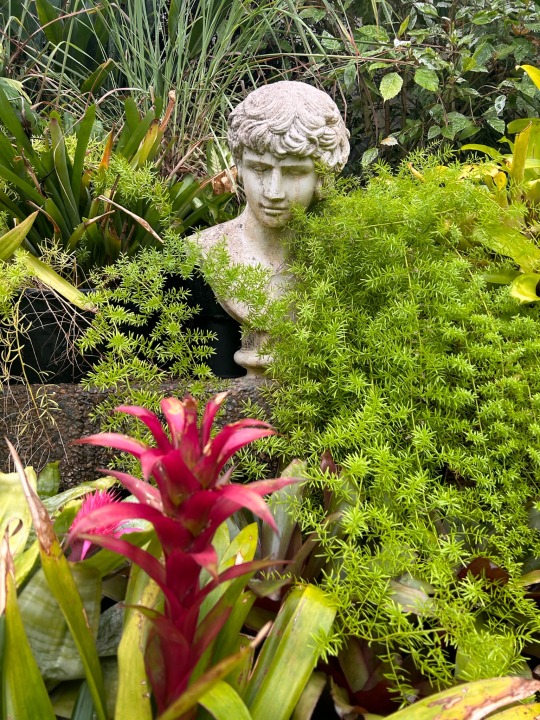
2 notes
·
View notes
Photo
wormskinrug said: #love seeing all the fish statues in the notes#i have fond memories of skiving off from school with my friends and hanging out by the big fish
So good seeing the big Belfast fish again!
It sounds like a really good friend to hang out by when skipping school!
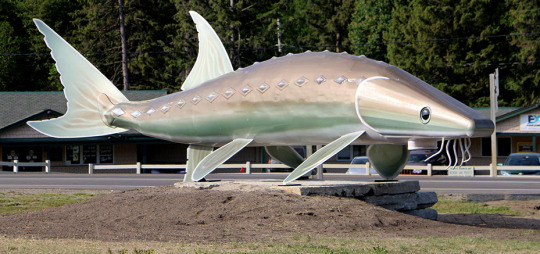
here is our local sturgeon sculpture. he is shaped like a friend and i love him :)
48K notes
·
View notes
Text
Days 5 - 7: Belfast - Dublin, the start of a tram system, Grafton Street and an excellent bacon sandwich to go with my Guinness pint.
Hi everyone, Welcome to Day 5 of my visit to Europe in Summer 2004. It is now Thursday 29th July 2004, and I had stayed two nights in Belfast, and had gone up and down that part of the UK. It is time now to go to Dublin, in the Republic of Ireland. I have breakfast at the rail station, called "Ulster fry", take the international train to Dublin, stopping only at Portadown, and arriving about 10:30 AM in Dublin Connolly. I went on a walking tour from the central post office on to Grafton Street, also viewing the Book of Kells at Trinity College. I took a ride on the LUAS from St. Stephen's Green down to Sandyford and back. The next day I went on a clockwise bus tour of Dublin, walked to Drumcondra, rode the train to Dublin Connolly, took the train to Howth and back, ate supper in Howth, then took a bus back to the hostel to sleep for my next journey on 31st July. Hope you will join me.
Dia daoibh, Fáilte go Lá 5 de mo chuairt ar an Eoraip i Samhradh 2004. Is é Déardaoin an 29 Iúil 2004 anois, agus d'fhan mé dhá oíche i mBéal Feirste, agus chuaigh mé suas agus síos an chuid sin den RA. Tá sé in am anois dul go Baile Átha Cliath, i bPoblacht na hÉireann. Tá bricfeasta agam ag an stáisiún traenach, ar a dtugtar “Ulster fry”, tóg an traein idirnáisiúnta go Baile Átha Cliath, ag stopadh ag Port an Dúnáin amháin, agus ag teacht timpeall 10:30 AM go Baile Átha Cliath Uí Chonghaile. Chuaigh mé ar thuras siúlóide ón oifig phoist lárnach go Sráid Grafton, ag féachaint ar Leabhar Cheanannais i gColáiste na Tríonóide freisin. Thug mé turas ar an LUAS ó Fhaiche Stiabhna síos go Áth an Ghainimh agus ar ais. An lá dár gcionn chuaigh mé ar thuras bus deiseal go Baile Átha Cliath, shiúil mé go Droim Conrach, mharcaigh mé ar an traein go Baile Átha Cliath Connolly, thóg mé an traein go Binn Éadair agus ar ais, d'ith mé suipéar i mBinn Éadair, ansin thóg mé bus ar ais go dtí an brú chun codladh do mo chéad lá eile. turas ar 31 Iúil. Tá súil agam go mbeidh tú páirteach liom.
Ciao a tutti, Benvenuti al 5o. giorno della mia visita in Europa nell'estate del 2004. È giovedì 29 luglio 2004, e sono rimasto due notti a Belfast, e ho viaggiato su e giù per quella parte del Regno Unito. Ora è il momento di andare a Dublino, nella Repubblica d'Irlanda. Faccio colazione alla stazione ferroviaria, chiamata "Ulster fry", prendo il treno internazionale per Dublino, fermandomi solo a Portadown, e arrivo verso le 10:30 a Dublino Connolly. Ho fatto un giro a piedi dall'ufficio postale centrale a Grafton Street, visitando anche il Book of Kells al Trinity College. Ho fatto un giro sulla LUAS da St. Stephen's Green fino a Sandyford e ritorno. Il giorno dopo ho fatto un giro in autobus in senso orario di Dublino, ho camminato fino a Drumcondra, ho preso il treno per Dublino Connolly, ho preso il treno per Howth e ritorno, ho cenato a Howth, poi ho preso un autobus per tornare all'ostello per dormire per il mio prossimo viaggio il 31 luglio. Spero che vi unirete a me.
Bonjour à tous, Bienvenue au cinquième jour de ma visite en Europe cet été 2004. Nous sommes le jeudi 29 juillet 2004 et j'ai passé deux nuits à Belfast et j'ai parcouru cette partie du Royaume-Uni de long en large. Il est temps maintenant d'aller à Dublin, en République d'Irlande. Je prends mon petit-déjeuner à la gare ferroviaire, appelée "Ulster fry", je prends le train international pour Dublin, je m'arrête seulement à Portadown et j'arrive vers 10h30 à Dublin Connolly. J'ai fait une visite à pied depuis la poste centrale jusqu'à Grafton Street, et j'ai également visité le Livre de Kells au Trinity College. J'ai fait un tour en LUAS de St. Stephen's Green jusqu'à Sandyford et retour. Le lendemain, j'ai fait un tour en bus dans le sens des aiguilles d'une montre à travers Dublin, j'ai marché jusqu'à Drumcondra, j'ai pris le train jusqu'à Dublin Connolly, j'ai pris le train jusqu'à Howth et retour, j'ai dîné à Howth, puis j'ai pris un bus pour retourner à l'auberge pour dormir avant mon prochain voyage le 31 juillet. J'espère que vous vous joindrez à moi.
Hallo zusammen, Willkommen zu Tag 5 meiner Europareise im Sommer 2004. Es ist jetzt Donnerstag, der 29. Juli 2004, und ich habe zwei Nächte in Belfast verbracht und bin durch diesen Teil des Vereinigten Königreichs gereist. Jetzt ist es Zeit, nach Dublin in der Republik Irland zu fahren. Ich frühstücke am Bahnhof, das „Ulster Fry“ heißt, nehme den internationalen Zug nach Dublin, halte nur in Portadown und komme gegen 10:30 Uhr in Dublin Connolly an. Ich habe einen Spaziergang vom Hauptpostamt zur Grafton Street gemacht und mir dabei auch das Book of Kells im Trinity College angesehen. Ich bin mit der LUAS von St. Stephen’s Green nach Sandyford und zurück gefahren. Am nächsten Tag machte ich eine Bustour im Uhrzeigersinn durch Dublin, ging zu Fuß nach Drumcondra, fuhr mit dem Zug nach Dublin Connolly, nahm den Zug nach Howth und zurück, aß in Howth zu Abend und nahm dann einen Bus zurück zum Hostel, um dort für meine nächste Reise am 31. Juli zu schlafen. Ich hoffe, Sie begleiten mich.
On Thursday 29 July 2004, I had been staying at the Belfast YHA hostel. It was time to check out, and go south to Dublin, in the Republic of Ireland. I would take the international train from Belfast Lanyon Place, then called Belfast Central, and ride in first class to Dublin Connolly. The train would stop only in Portadown, just north of the border. I checked out, with my luggage, walked to the Botanic rail station, took a 80 class train to Lanyon Place station, and went upstairs to the cafe for "Ulster Fry". Ulster Fry is not much different from Full English breakfast, except that it has a few more fried items. I had egg, bacon, sausage, a "potato farl", kind of like a hash brown patty, and a fried mushroom. I had one cup of tea, and another of coffee. About 7:50 AM, I went downstairs to the platform where the train to Dublin would depart from. I found my seat in First Class. Somehow I ended up in the dining car, but did not order anything.
The train left about 8 AM. I had my radio with me, on one of the local FM stations, they played "Ninety Miles from Dublin" by Christy Moore. The train made a prerecorded announcement of the train arrival in Dublin Connolly in the middle of the song. Later on, I heard "Lola's Theme" by the Shapeshifters as well as "Inner Smile" by Texas (a Scottish band that started in the late 1980s but did not achieve fame until at least their "White on Blonde" LP in 1997 / 1998). It seemed, from Belfast to Dublin, that it would be impossible to notice the difference between Northern Ireland and the Republic. It was only after the train passed through Drogheda (pronounced "Draw-dah"), that I would notice that I was in the Republic of Ireland. The train did not make any stops between Portadown and Dublin Connolly. The weather was a bit on-and-off rainy.
Most of the Irish railway system is unelectrified. Only from Howth to Bray was there any electrification on the main line, when I last read an article about the Irish railway system. I was surprised, already at Malahide there was electrification. The train was not very far from Connolly station. The train arrived about 10:30 AM on its own track. The exit was gated, so I had to go through the gates to exit the station for the bus to the hostel. I did not see any left luggage area in that station, though I have been told that there is one at the Heuston station due west of Connolly.
Leaving Connolly station, the statin building itself looks like something I might have seen in Northern Italy, kind of like from the Sforza family of Milan. Across the street from Connolly Station is the Busaras, or the central bus station. I asked about how to get to the hostel, but I was told to go to O'Connell Street by Abbey Street Lower and get a city bus from there. Although the LUAS red line tracks were being tested, that line would not go into operation until at least September or October that same year (2004). I had to walk along the sidewalk following the tracks to O'Connell Street. I saw a few light rail vehicles pass by. I knew of the green line, but it would not go farther north than St. Stephen's Green for many years (in 2024 it goes as far as Broombridge).
The Central Post office is at 47 O'Connell Street Lower. In at least one of the six Ionian columns, bulletts were shot into them in the 1920's struggle for independence from Great Britain. Nearby is an obelisque and on the opposite side of the road, towards Connolly Rail Station, is a statue of the writer James Joyce, who wrote "Ulysses". Incidentally, James Joyce was buried in Zurich, Switzerland, which I would visit on 7th August that same year. Only in the early 2020's, did the LUAS green line start operating along O'Connell Street Lower.
When I arrived at the post office bus stop, I found the bus route that went right to the hostel. It was about the corner of Dorset and Wellington Streets. Some time in the 2010s the actual building had been torn down, and has been replaced by university housing. I bought a day pass for the bus, which I think was 4 Euro back then. The bus went past Parnell Square before it made its stop on Dorset Street. I checked into a room with six beds. At the time, I did not see that an actual bed assignment would make any difference. Most of the time, no one minds if the wrong one might be accidentally taken. I would find out very early Saturday morning, that people would make a fuss. But for now, I would charge up my phone and my video camera, and in about an hour's time, walk to the bus stop at Blessington and Dorset, to go into downtown.
After I alighted from the bus at the post office, I walked along O'Connell Street. I made sure I had a good photo of the James Joyce statue. Then I walked past Middle Abbey Street, then along the Liffey to The Famine Memorial, at the Talbot Memorial Bridge. Many of the statues of the Famine Memorial looked lifelike. Then I went back to the O'Connell bridge, crossed the Liffey and stopped by the Mr. Screen cinema. There was nothing playing that I wanted to particularly see, so I walked farther south to College Street and on to Grafton Street. I entered the university at Nassau Street and went north to the library past Fellow's Square. The Book of Kells did not allow any photography. I was able to notice the pages of the bible, written on calfskin using various pigmentations.
Leaving the library, I went along Grafton Street to the St. Stephen's Green rail station. In general, Grafton Street is a pedestrian only passage. I passed by the Bewley's Cafe. They make good toffee sweets. At the time, the LUAS green line did not operate anywhere north of St. Stephen's Green. I walked to FitzWilliam Street Lower, along to Merrion Square. At the northwest end of the park, there was the Oscar Wilde statue. He was sitting, more like lying, on a rock, as if it were a bean bag. I walked by the Leinster House, the current seat of government for the Republic of Ireland, and also one of the ministries, probably for health and human services or similar.
At St. Stephen's Green, I bought a two ride ticket for LUAS. LUAS at the time, did not accept the bus pass, so I had to pay about 5 Euro for a day pass. I validated it, and boarded the next green line LUAS to Sandyford. The train went straight down Harcourt Street, before turning left on Adelaide Road, and turning right onto its own right of way. The LUAS went past Beechwood but somehow I had drifted off to sleep. I think it was still the jet lag. I was inspected by a fare inspector, and they said my ticket was fine. I alighted at Sandyford, the current southern terminus of the LUAS green line, and waited for the next one back to St. Stephen's Green. Once the LUAS arrived at St Stephens Green, I walked up Grafton Street, past the O'Connell Bridge to the post office, took the bus to Dorset Street, then went to the hostel. I think I went to sleep after that. I don't remember doing much else, other than listen to the radio and record local station broadcasts, some in English, some in Irish Gaelic.
On Friday 30th July 2004, it was a much nicer day than Thursday the 29th. I woke up, took a shower, and went downstairs to eat breakfast. The "Full Irish Breakfast" was at an extra charge, where the continental one was included in my stay. I went for the Full Irish breakfast, but it did not contain any black and white pudding, which is like a blood sausage, or a morcillo for those who know about Spanish sausages. I would hope to go into town and maybe have some black and white pudding, but I eventually waited for the next day.
I took the bus to the post office on O'Connell Street Upper, buying a day pass. There was a hop on hop off bus stop, where I could buy a ticket, good for all day transit on the hop on hop off bus. I had to wait until 10:20 AM until the bus departed. The bus went along the route past Parnell Square, the Obelisque, and back again south of the Liffey. The bus went past Trinity College, the house that Bram Stoker of "Dracula" fame once lived, the Molly Malone statue, St. Patrick's Cathedral, St. James Hospital, the Guinness Brewery, Magazine Fort, Heuston Station, and Ha'Penny Bridge. I alighted at Ha'Penny Bridge, and looked for some place to eat. On Anglesea Street just off Fleet Street, I found the Oliver St. John Gogarty pub. It also operated a hostel next door. I ordered a pint of Guinness and a bacon sandwich with fries. It was very good.
I went down the Grafton Street walkway before turning back and taking a bus to the post office. I bought some stamps for postcards at the office. Somehow there after I ended up walking east on Cathal Brugha Street past the Five Lamps to Clonliffe Road. I walked past the GAA Museum at Croke Park. Eventually I would end up at Drumcondra rail station. I could use my Eurail pass to gain access to the train platform for Connolly Station. The section between Drumcondra and Connolly was not electrified in 2004. I was feeling tired after walking so much. I think it was about 4 PM when I caught the train from Drumcondra to Connolly. Instead of the 80 class NIR DMU unit, I was riding on a nice commuter rail train. About where the train crossed Newcomen Bridge, the train came onto the electrified section to Bray/Greystones. At Connolly I transferred to the DART, which also recognized the Eurail Pass. It would be about 4:30 PM when I would board the train for Howth, called Binn Eadair in Irish.
The train to Howth arrived about 4:30 PM. It made about 9 stops before arriving at Howth. Howth is on a peninsula, and on the north side there is a harbor. There is also a shopping area and park close by. I had supper at the Fish Market. I think I had cod and chips along with a salad, and a pint of Guinness. It was really good, cost maybe 15 Euro. About 7 PM I went back to the Howth station to wait for the train back to downtown Dublin. Entering the station, I asked the guard if they would like to see my Eurail Pass, but he said "not particularly" instead of "No". He let me on to the platform. The train did not arrive until 7:30 PM. It departed about 7:40 PM. I stayed on the train until I arrived at Pearse Street. Pearse Street is an elevated commuter rail station. If you look eastward on Westland Row, you might think that you would be seeing a scene of "Glengarry Glenn Ross", where they say "Coffee is for closers". I took the bus back to the post office, and another one of the hostel. Then I went to sleep, at least for a while. Then I was woken up about 5 AM or so. But that's a story for another day.
I hope you will join me in my next journey, from Dublin to Milan. Question: at what airport do I get my passport checked? If you know Ireland's customs union with the UK, it may likely not be at Heathrow, but please stay tuned anyway. See you then!
#Belfast#Lanyon Place#IE#NIR#Ulster fry#Dublin#Connolly#Abbey Street#LUAS#Famine monument#O'Connell Street#Post office#Ireland#Trinity College#Book of Kells#St. Stephen's Green#Sandyford#James Joyce#Parnell Square#Molly Malone statue#Bram Stoker#St. Patrick's Cathedral#Guinness brewery#Oliver St. John Gogarty#Liffey#GAA#Croke Park#Drumcondra#DART#Howth
0 notes
Note
Good GIF of Cait in The Amateur's latest trailer.
https://x.com/fgmnot_daf/status/1901666710270235071
Thanks for the ☘️ message, Anon, 😃.

Twitter
My Inbox overfloweth. 🌊 So many thoughts and opinions about The Amateur drama… and little to none about the film itself.
My Inbox is also experiencing technical difficulties, as was my dashboard the other day. Messages have disappeared. I don’t know why or if they’re coming back.
This is what I remember seeing before they disappeared.
Plus-One Anons
Her husband did attend the European Premiere in London. A fan, who saw him in person at the Le Mans ‘66/Ford v. Ferrari and Belfast premieres in London, saw him again, in person, on Monday the 31st of March. If you want to read her account, you could start here and scroll up to read subsequent posts.
To date, we’ve seen no photo. This is not him:

Original photo: Robin Pope Photo (red-circled by fan)
Interview Anons
Almost every link I received led to… wait for it… parody songs and interviews, not about The Amateur, but about the global tariffs debacle. I don’t know if this misdirection was yours or Tumblr’s, Anons, but it was entertaining.
Divorce Anons
Seriously? 🤦🏻♂️
Instagram Follows Anons
You are correct: neither brother’s company has an Instagram account. 🙄
Remember… fandom, after all, is born of a balance between fascination and frustration: if media content didn't fascinate us, there would be no desire to engage with it; but if it didn't frustrate us on some level, there would be no drive to rewrite or remake it. — Henry Jenkins
#Tait rhymes with hat#Good times#Inbox#The Amateur#Inquiline#Gif#Received 17 March/Responded 6 April 2025#Others? 🤷🏻♂️
36 notes
·
View notes
Text
As war rages between Israel and Hamas in the Gaza Strip, it is hard to envision an end to the conflict. For decades, though, a growing movement of Palestinian and Israeli women has not only envisioned a peaceful coexistence, but also demanded it.
Just three days before Hamas’s Oct. 7, 2023, attack, thousands of women from two peacebuilding groups gathered at Jerusalem’s Tolerance Monument for a rally and march. Israelis from Women Wage Peace carried blue flags, and Palestinians from Women of the Sun flew yellow ones.
Members of the two groups traveled to the Dead Sea—believed since ancient times to have healing qualities—and set a table. Women from both sides pulled up chairs as a symbol of a good-faith resumption of negotiations to reach a political solution.
Women Wage Peace formed in response to Operation Protective Edge, which was Israel’s 2014 invasion of Gaza in the wake of then-U.S. Secretary of State John Kerry’s failed effort to restart final status negotiations.
“We, Palestinian and Israeli mothers, are determined to stop the vicious cycle of bloodshed,” reads the preamble to their campaign, the Mother’s Call. This campaign was nine months in the making, and it involved aligning around a single agenda that demands a political solution within a limited time frame.
They set the table to show the importance of dialogue and women’s involvement in decision-making. But in the war between Israel and Hamas that has started since then, women’s voices are largely missing from negotiations and consultations.
Ensuring women’s participation isn’t about equity or fairness or a show of inclusion. It’s about winning the peace.
In 2014, Laurel Stone, then a researcher at Seton Hall University, conducted a quantitative analysis of 156 peace agreements over time. She found that when women are decision-makers—serving as negotiators and mediators—the probability of an agreement lasting at least two years increased by 20 percent. The probability of the agreement holding for 15 years increased by 35 percent.
Many studies show that women tend to be more collaborative, more focused on social issues over military issues, and less likely to attack those who hold differing views. With women at the table, the potential for risk-taking behavior and attacks on perceived enemies may be lower. In diverse teams, decisions are more likely to be based on facts than assumptions.
While men are more likely to be fighters in war, the work of holding families and communities together more often falls to women, and according to some studies, it’s women who more frequently stand up for a return to negotiations, civilian protection, and an end to violence.
“We learned from the cases of Northern Ireland and Liberia,” Yael Braudo-Bahat, the co-director of Women Wage Peace, told Foreign Policy. Women’s active participation greatly strengthened these peace and recovery processes.
Ahead of the formal talks that led to the Belfast Agreement in Northern Ireland, Catholic and Protestant women’s groups formed the Northern Ireland Women’s Coalition and gained two seats at a table of 20 in formal negotiations. As one of the few groups that moved beyond the sectarian divide, its members were seen as honest brokers. They represented civil society concerns and helped ensure that the agreement included commitments for social healing and integration.
Because the brutality of war falls disproportionately on women—they frequently are the first to go hungry, serve as the de facto caretakers, and become the victims of increased gender based violence—they are often committed to finding a path to peace even when male leaders won’t compromise.
During the Second Liberian Civil War, women played a heroic role by successfully pressuring male decision-makers to negotiate. The documentary Pray the Devil Back to Hell, directed by Gini Reticker and produced by Abigail Disney, popularized the incredible story of how women convinced the warring parties to attend peace talks in Accra, Ghana.
“We were the ones watching our children die of hunger … we were the easiest targets of rape and sexual abuse,” said Nobel Prize laureate Leymah Gbowee, the founder of the Women for Liberia Mass Action for Peace grassroots movement, which played a major role in pushing then-President Charles Taylor to sign a peace agreement in 2003. This common suffering among women formed the basis for unity across political and religious divides.
In Israel and Gaza, women will need to play an important role in the implementation of any new accord between Israel and Palestine, Braudo-Bahat said. Her organization’s partnership with its Palestinian counterpart, Women of the Sun, has remained steadfast, even after learning that her co-founder, Vivian Silver, 74, was murdered by Hamas on Oct. 7.
“We continue our plans—we work together, and we don’t hide it,” she said. “It might be dangerous to the Women of the Sun, but they are so courageous.”
Although many Palestinians want peace, for others, “peace is normalization,” a member of Women of the Sun wrote to Foreign Policy via WhatsApp, choosing to go by the initials M.H. to preserve her anonymity and safety. Some Palestinians think that “it’s something shameful to be dealing with Israel,” she added, because it could imply that the Israelis’ treatment of, and policies toward, Palestinians are tolerable.
“I believe we should actively engage and collaborate, even if some label it as normalization,” M.H. said. “I am committed to working toward a better future for us.”
International law is on the side of these women. United Nations Security Council Resolution 1325, adopted unanimously more than 23 years ago, urges all member states to increase the participation of women in peace and security efforts, and highlights women’s essential role in preventing war, protecting civilians, and negotiating lasting peace.
Despite Israel’s deteriorating track record with regard to women’s rights and roles as decision-makers, women are involved in the war as politicians, members of the military and civilians. Women in politics have made important advances for gender equity, although among the 32 cabinet ministers sworn in a year ago, only five were women. One of those women ministers was dismissed amid the recent closure of the Ministry for the Advancement of Women.
The reality for women in Gaza is far more challenging when it comes to holding leadership positions. Women generally do not participate in public political activities or hold public office, although Hamas appointed 23-year old Isra al-Modallal as its first female spokesperson in November. She told the Guardian newspaper that she is not a member of Hamas or any political party.
At the start of the conflict, Hamas had just one woman, Jamila al-Shanti, 68, serving as part of the organization’s 15-member political bureau. Al-Shanti, who was also a founder of Hamas’s women’s movement, died in an Israeli airstrike on Oct. 19.
“You can hear amazing rhetoric and lip service, even from the Palestinian leadership,” Dr. Dalal Iriqat, an assistant professor at the Arab American University in the West Bank, told Foreign Policy. “But when it comes to practice, I always find a scarcity of women in decision-making.”
Women’s organizations in the Palestinian territories and in Israel have a rich history of political engagement, however. Palestinian women created social structures such as health clinics and orphanages for displaced Palestinians following the 1948 Arab-Israeli War. Following the Six-Day War in 1967, with traditional political structures in tatters and both Gaza and the West Bank under Israeli occupation, women of every social class stepped up.
It was through the networks they formed that a new cadre of women activists emerged as a force in December 1987, when Palestinian frustration with Israeli rule broke out in a popular uprising that became known as the First Intifada, or “shaking off.” Underlying this largely nonviolent Palestinian struggle was a collective social, economic, and political mobilization led by women.
Palestinian political leadership acknowledged women’s centrality in the Intifada, which paved the way for negotiations with Israel when it included three women—Suad Amiry, Zahiria Kamal, and Hanan Ashrawi—as part of the delegation that participated in the Middle East peace talks that culminated with the Madrid Conference in October 1991.
Ultimately, though, exiled Palestinian Liberation Organization leaders shunted the Madrid framework to begin secret negotiations with Israel that resulted in the security-focused Oslo Accords and the establishment of the Palestinian Authority. Under their leadership, Israeli occupation, and the failures of the Oslo Accords, democratic ideals and women’s rights eroded.
Israel and the United States have discussed a potential role for the Palestinian Authority in Gaza after the military operation. The Palestinian Authority has three women ministers, including its minister for women’s affairs, though women still struggle for equal opportunities and freedom from violence.
“Women usually refrain from being [an] activist in politics,” said an activist in the West Bank who withheld her name for security reasons. “Women are frightened to be involved in political activities, because they will be put in jail or be subjected to any kind of violence.” And the conditions are much worse for women when funding is restricted, as well as under Hamas, she said.
Serena Awad, a Gazan nonprofit worker who is now living in Rafah, told Foreign Policy that Gazan women are directing and managing many aspects of the humanitarian response. These women work for the United Nations as well as in health, cultural, child protection, human rights, sports, and legal organizations.
“I have lived through six aggressions, and every time, I wait for my turn to die,” said 24-year-old Awad. “What I want the world to know is that women in Gaza are like any other women—we study, go to work, have our own family, but we suffer.”
Israeli and Palestinian women working as peacebuilders say they need more international support. Women’s organizations are notoriously underfunded in the best of times, with only 0.4 percent of global gender-related funding going directly to women’s rights organizations, according to calculations by the Association for Women’s Rights in Development.
During crises, women’s rights often take a back seat. Women of the Sun’s 2024 budget is approximately $100,000, and Women Wage Peace’s budget is approximately $1 million, according to the organizations’ representatives.
Women’s groups are more likely to be effective during negotiations and during the implementation of recovery programs when they have access to external funding. During the peace process between Sudan and South Sudan, for example, South Sudanese women were highly mobilized as delegates, but some had to pause their involvement so they could go back to earning money.
In addition to funding, democratic countries have a role to play by insisting on women’s participation in negotiations, said M.H. of the Women of the Sun. She and other peacebuilders say that the United States and the United Nations should be more active in promoting women as counterparts, negotiators, and experts.
“By will, things can happen,” M.H. told Foreign Policy “And if the US says it [that women should be involved in negotiations], it can happen.”.
Talks convened by Qatar, the United States, and Egypt to end the conflict between Hamas and Israel are underway. These countries and other regional players—including Jordan, Israel, and the Palestinian Authority, have previously created national action plans that recognize the unique impact of war on women and their crucial role in promoting peace, culminating in 107 countries worldwide forming national action plans to empower women.
Still, news coverage reveals little or no evidence of efforts by these countries to promote women’s participation in the Israel-Hamas conflict.
The U.S. State Department is “working to ensure the expertise of women from civil society and in government is incorporated in any process related to the current conflict in Gaza,” wrote a spokesperson in an email.
If the political will for participation exists, both Israelis and Palestinians have a robust list of women advocates from which to draw for official and nonofficial negotiations and discussions. A diverse list of 12 Israeli and Palestinian women who are qualified to participate in negotiations was provided by the 1325 Project run by members of Women Lawyers for Social Justice—known in Israel as Itach Ma’aki—to the U.S. Embassy and other embassies and international bodies.
“At least one person will be engaging in Track 2 and 3 efforts, and she was approached through us by an international body,” said 1325 project co-director Netta Loevy, referring to nonofficial negotiations and consultations.
Braudo-Bahat, meanwhile, urged policymakers to involve women in discussions now—not after violence ends. “The day after the war is yesterday … we need to start now,” she said.
Back in Gaza, the water tastes like poison; it’s freezing, and Awad, the 24-year-old nonprofit worker, keeps losing weight. She asked almost a dozen Gazan women leaders what they think should happen to resolve the war and to ensure that women participate in negotiations.
No one could give her an answer. They were busy responding to humanitarian needs, and telecommunication and internet services were out.
“Nothing has changed, but what can we do about it? All we can do is waiting and praying for this to end,” Awad wrote to Foreign Policy through WhatsApp, which only works for her about once every four days.
Iriqat, the Arab American University professor, has one wish: “That someone considers that if women are in charge, and involved, a more strategic agreement could hold.”
113 notes
·
View notes
Text
11/15-16/2024 Daily OFMD Recap
TLDR; David Jenkins; Rhys Darby; Taika Waititi; Con O'Neill; Samba Schutte; Adam Stein; Dominic Burgess; Fan Spotlight: Fluffvember Reminder; OFMD Advent Calendar; Love Notes; Daily Darby / Today's Taika;
= David Jenkins =
Chaos Dad was sharing some sweet fan videos this past weekend on twitter-- but it wont let me link the video in tumblr, so here it is on Instagram by the same person!
instagram
Source: Astralvcid's Instagram
== Rhys Darby ==
Rhys out and about in LA and running into fans!

Source: Ops35mm's Instagram
Rhys will be joining the San Francisco Comedy Festival that's going on between January 16-Feb 2, 2025! Thank you to @adoptourcrew for shouting this out!

Source: Adopt Our Crew's Tumblr
= Darby Daily Doodles! =
I'm so behind on sharing the Darby Daily Doodles! Here's a pile for you since there's image room today!
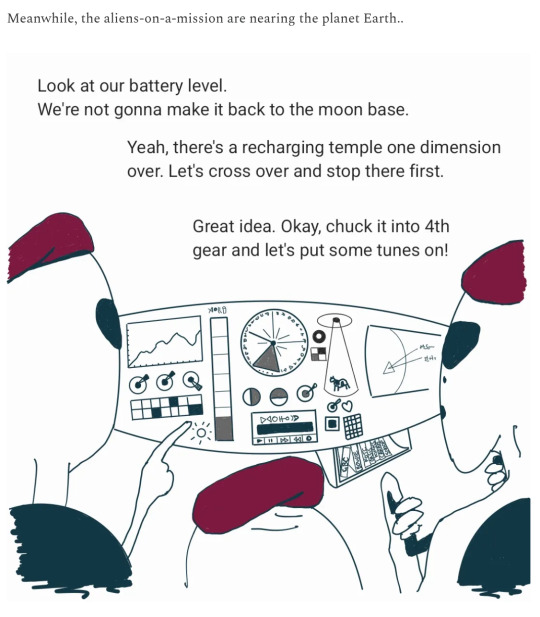
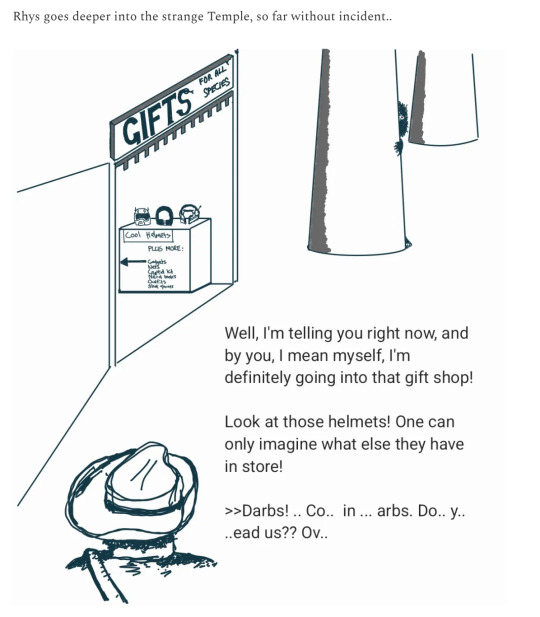

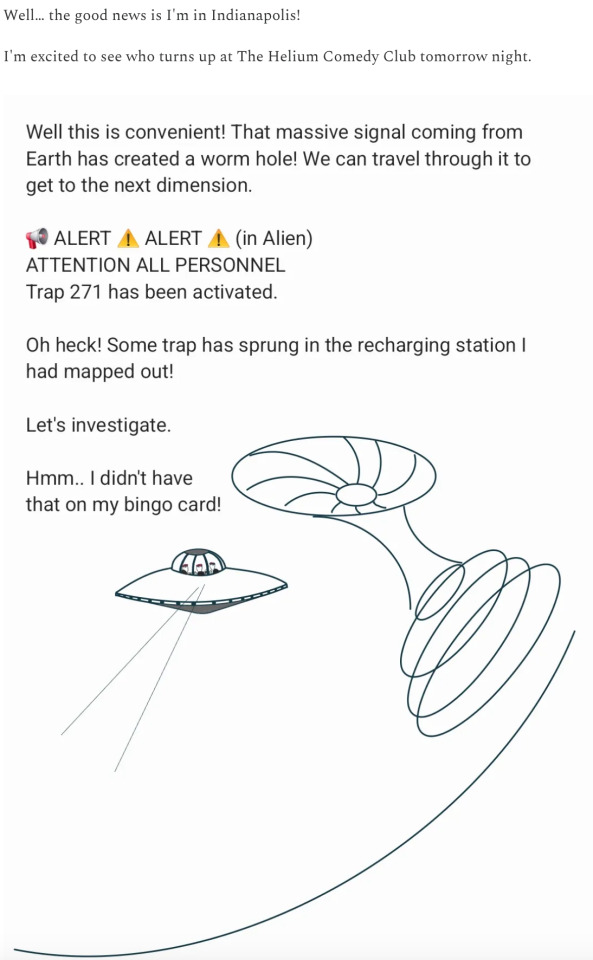
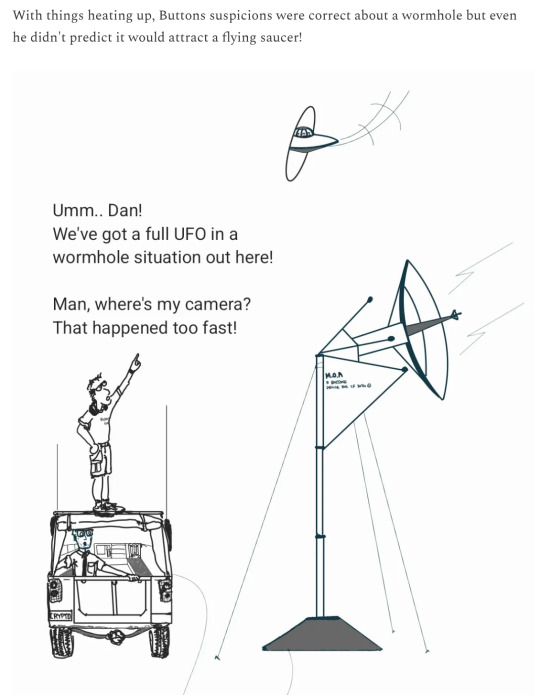
Source: Rhys Darby's Free Substack
= Darby Family Kittens =
The Darby's are still looking to adopt out these kittens! If you are in the area and looking for some adorably sweet and energetic (if not chaotic) kittens, please hit up https://www.instagram.com/kittenrescuela/ and help Rhys and Rosie reduce the cat size of their house!
Source: Rosie's Instagram
= Taika Waititi =
More of Taika out at the Interior Chinatown premiere, this time with Tzi Ma!

Source: Tzima8's Instagram
Taika and Jimmy O were on Good Morning America talking about Interior Chinatown!
youtube
Source: Youtube
And a tragedy/comedy in 5 parts.




Source: TV Insider's Instagram
An article about the Boy and the Octopus <3

Source: Belfast Telegraph UK
= Con O'Neill =
New trailer for Con's new role in SAS Rogue Heroes!
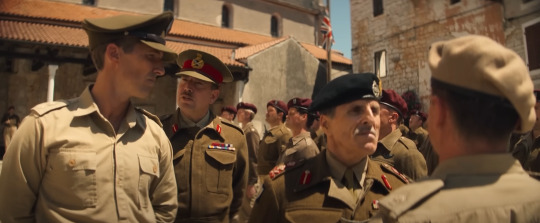
youtube
= Samba Schutte =
Samba sent out another thank you everyone who attended his Momentus event!
"Thank you again to all 250+ of you who joined my Death by Cheese baking class🙏🏾 We are able to serve over 4000 meals to hungry kids, elders and families thanks to your generosity via @lafoodbank❤️ Thank you thank you thank you, and so happy you love my mac and cheese recipe🫶🧀"

Source: Samba's Instagram
= Adam Stein =
Our fab writer/executive producer/extra Adam Stein has been active with Waiting for Godot, and also getting to meet one of his idols!



Source: Geffen Playhouse Instagram
= Dominic Burgess =
Dominic was out at the Paramount backlot!
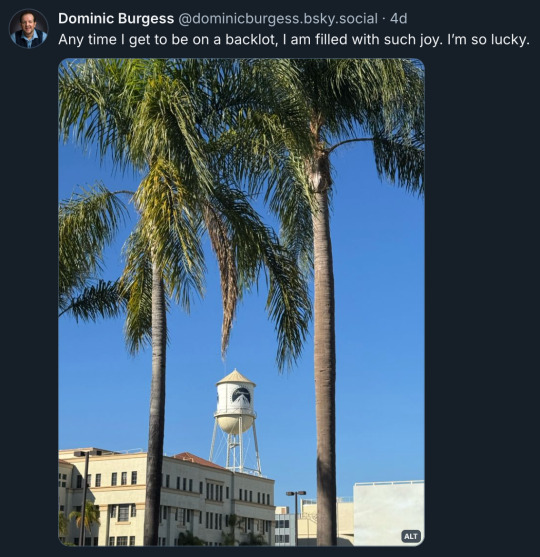
Source: Dominic's Bsky
== Fan Spotlight ==
= Fluffvember Reminder =
Fluffvember is still going on! You can check out what's been posted or interact with them on bsky! ofmdfluffvember.bsky.social there's also some fluffvember going on over here on tumblr! Check it out!

Source: ofmdfluffvember.bsky.social
As a taste-- Our darling crewmate @blueberreads' is back with more pixel art! This time of our Boyfriends!
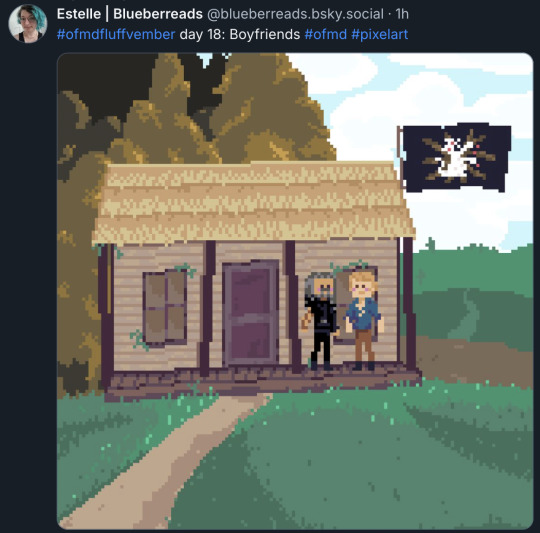
Source: Bluberreads Bsky
= OFMD Advent Calendar =
Sounds like things are ramping up for an OFMD Advent Calendar this year! All the collaborators have been found so if you'd like to keep an eye out for the advent calendar starting Dec 1, you can follow them on Bsky!
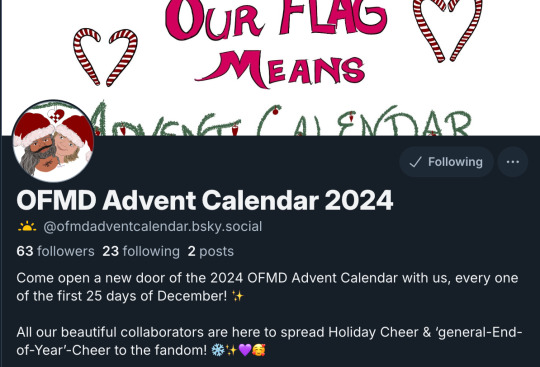
Source: OFMD Advent Calendar 2024 Bsky
== Love Notes ==
Hey there lovelies. I hope the weekend has been treating you well and you've gotten some good rest. We've got some holidays coming up soon-- do you get to take any time off?
I hope you know that you are loveable no matter where you are in life. I hope you know that you are worthy of that love no matter where you are, no matter what you've done, and now matter how little or how much you've accomplished. A lot of people in this world want you to believe you are only worth something if you are making money, or gaining status, but you are worth so much just being your goofy, wonderful self. Please take care of yourselves this week lovelies. Rest well <3
instagram
Source: Anxiety Positive Instagram
== Daily Darby / Today's Taika ==
Heyyyy been a while since I was able to get one of these in here! There's been so much going on! I know I've used the Taika one before, but it's too good not to apply with Rhys working out. Today's gifs courtesy of the fabulous @daxxlovesrhys and @meluli!


#ofmd#daily ofmd recap#ofmd daily recap#our flag means death#rhys darby#save ofmd#taika waititi#adopt our crew#adam stein#david jenkins#dominic burgess#jimmy o yang#interior chinatown interview#con o'neill#ofmd advent calendar#ofmdfluffvember#Instagram#Youtube
42 notes
·
View notes
Text

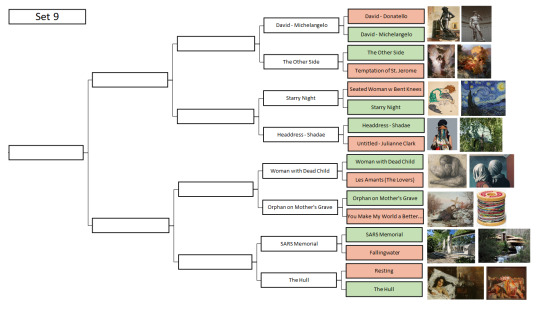

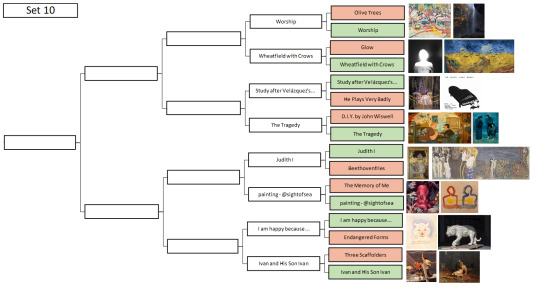
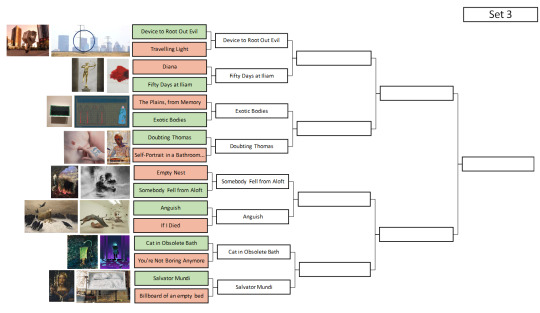








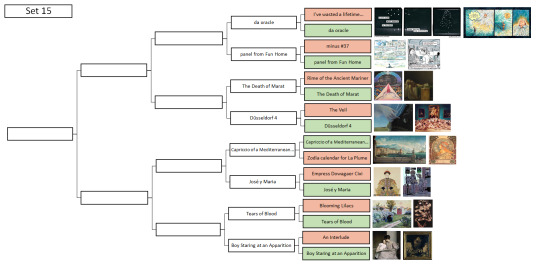
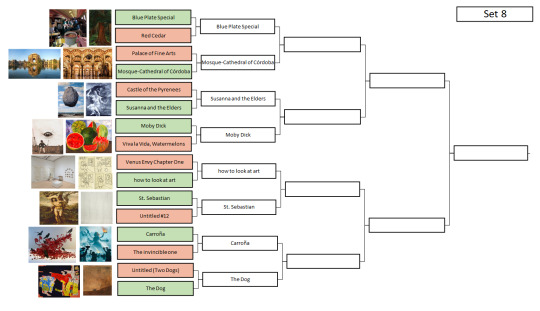

Behold, a bracket!
Text form below the cut because trying to copy all the 256 into the alt text sounded.... horrifying. Warning for 128 matchups, seriously, this list is long, and so I've avoided adding the artists until the polls.
a note: the pinned post has started misbehaving, so only open polls will be directly linked. closed polls instead have the results page linked in the set header, all the polls are linked from there
Set 1
The Lament for Icarus (Miao He) vs The Lament for Icarus (Herbert Draper)
The angel came to me in a fever hallucination, perched upon my bed as I returned from the bathroom. vs Sweet Brown Snail
Figures vs A Philosopher Lecturing on the Orrery
Happy Shoppers vs Hubble Deep Field
Lovers Painting vs Bath Curtain
Dr. Helen Taussig vs Une Martyre
Orangoutang étranglant un sauvage de Bornéo (Orangutan strangling a Borneo savage) vs Can’t Help Myself
Rape vs Technicolor Hiroshima
Set 2
A Walk at Dusk vs Based on “Autoportrait with the Model” by Maria-Rayevska Ivanova
Diary Page vs Les Jours Gigantesques (The Titanic Days)
Dead of Night vs You Won't
Christina's World vs Bobby
Untitled (I’m Turning Into A Specter Before Your Very Eyes And I’m Going To Haunt You) vs Two Sisters (On the Terrace)
Sharecropper vs Lustmord
The Parca and the Angel of Death vs Untitled (Zdzisław Beksiński)
Stress vs The Fallen Angel
Set 3
Device to Root Out Evil vs Travelling Light
Diana vs Fifty Days at Iliam: The Fire that Consumes All before It
The Plains, from Memory vs Exotic Bodies
Doubting Thomas vs Self-Portrait in the Bathroom Mirror
Empty Nest vs Somebody Fell From Aloft
Anguish vs If I Died
Cat in Obsolete Bath vs You're Not Boring Anymore
Salvator Mundi (Savior of the World) vs Untitled (billboard of an empty unmade bed)
Set 4
There Will Be No Miracles Here vs Symphony of the Sixth Blast Furnace
Fox Hunt vs Tarpaulin
Khajuraho Group of Monuments vs Ranakpur Jain Temple
ปราสาทสัจธรรม (The Sanctuary of Truth) vs Grande Panorama de Lisboa
Heroic Head of Pierre de Wissant, One of the Burghers of Calais vs The Weather
The Daughters of Edward Darley Boit vs If this is art
Statue of Vincent and Theo van Gogh vs Jeanne d’Arc écoutant les voix (Joan of Arc listening to the Voices)
Fountain vs Judith Slaying Holofernes
Set 5
Cueva de las Manos (Cave of Hands) vs Cave of El Castillo
Chauvet Cave Bear vs Uffington White Horse
Laocoön and His Sons vs Winged Victory of Samothrace
Crouching Aphrodite vs Statue of Taweret
Guardian Figure vs Kūya-Shonin (Saint Kuya)
Ancient Greek doll vs Arena #7 (Bears)
Enbu (炎舞) (Dancing in the Flames) vs Yearning Shadows
Belfast to Byzantium vs Freedom
Set 6
The Kama Sutra of Vatsyayan vs Portraits
The Blood Mirror vs Nighthawks
Electric Fan (Feel it Motherfuckers): Only Unclaimed Item from the Stephen Earabino Estate vs "Untitled" (Portrait of Ross in L.A.)
Lady Agnew of Lochnaw vs Forgotten Dreams
Saint Bride vs Pixeles (a group of 9 works)
War Pieta vs The Sunset
The Handmaidens of Sivawara Preparing the Sacred Bull at Tanjore for a Festival vs Ajax and Cassandra
Nāve (Death) vs Abstraction
Set 7
Yes vs Meeting on the Turret Stair
Hacked to Death II vs Stańczyk
Closeness Lines Over Time vs Voice of Fire
The Maple Trees at Mama, the Tekona Shrine and Tsugihashi Bridge vs Portrait of Sir Thomas More
Survival Series: In a Dream You Saw a Way vs Takiyasha the Witch and the Skeleton Spectre
Death blowing bubbles vs The Kitchen Table Series
Painting 1946 vs In the Grip of Winter
Untitled (Black and Gray) vs NAMES Project AIDS Memorial Quilt
Set 8
Blue Plate Special vs Red Cedar
Palace of Fine Arts vs Mosque–Cathedral of Córdoba
Le Château des Pyrénées (The Castle of the Pyrenees) vs Susanna and the Elders, Restored - X-Ray
Moby Dick vs Viva la Vida, Watermelons
Venus Envy Chapter One (Of the First Holy Communion Moments Before the End) vs how to look at art
St. Sebastian vs Untitled #12
Carroña vs The invincible one
Untitled (Two Dogs) vs The Dog
SECOND HALF
Set 9
David (Donatello) vs David (Michelangelo)
The Other Side vs The Temptation of St. Jerome
Seated Woman with Bent Knees vs Starry Night
Headdress - Shadae vs Untitled for the Image Flow's Queer Conscience exhibit
Woman with Dead Child (Frau mit totem Kind) vs Les Amants (The Lovers)
Siroče na majčinom grobu (Orphan on Mother's Grave) vs You Make My World a Better Place to Find
Fighting Against SARS Memorial Architectural Scene (弘揚抗疫精神建築景觀) vs Fallingwater
Resting vs The Hull
Set 10
Olive Trees vs Worship
Glow vs Wheatfield with Crows
Study after Velázquez's Portrait of Pope Innocent X vs Untitled (He Plays Very Badly)
D.I.Y. by John Wiswell vs The Tragedy
Judith and the Head of Holofernes vs Beethovenfries (Beethoven Frieze)
The Memory of Me (How Could I Forget) vs oh god i had a really big epiphany about love and personhood but i’m too drunk for words
I am happy because everyone loves me vs 瀕危形態 (Endangered Forms)
Three Scaffolders vs Ivan the Terrible and His Son Ivan
Set 11
San Giorgio Maggiore at Dusk vs Water-Lilies, Reflection of a Weeping Willow
The Grief of the Pasha vs Monolith in Vigeland Sculpture Park
Passion vs Space Diner
Hamlet and Ophelia vs Two Earthlings
Ellen Terry as Lady Macbeth vs Seer Bonnets
Photograph from "SNAP OSAKA" Collection vs Clytemnestra after the Murder
“Untitled” (Perfect Lovers) vs The Lovers (TIE)
Kedai Ubat Jenun vs Orange Store Front
Set 12
The Apotheosis of War vs Portrait of the Dancer Aleksandr Sakharov
Julie Manet vs Mouth
The Icebergs vs Kaleidoscope Cats III
Maman vs Caza Nocturna (Night Hunt)
The Book of Kells Folio 188r: Luke carpet page vs Ardagh Chalice
Yusuf and Zulaikha vs Dome of the Rock mosaics
Rowan Leaves and Hole vs Untitled (prisonhannibal)
Le Désespéré (The Desperate Man) vs The Dedication
Set 13
Deimos vs Dog and Bridge
The Mocking of Christ vs Prudence
The Broken Column vs Siberian Ice Maiden shoulder tattoo
Transi de René de Chalon (Cadaver Tomb of René of Chalon) vs Head of Christ
The Day vs Spirit of Haida Gwaii
Eleanor Boathouse at Park 571 vs Jatiya Sangsad Bhaban জাতীয় সংসদ ভবন (National Parliament House)
Juventud de Baco (Bacchus Youth) vs Barges on the Seine
Oath of the Horattii closeup vs Visit hos Excentrisk Dam (Visit to an eccentric lady)
Set 14
Christ Crucified (With Donor) vs St. Francis
Thunder Raining Poison vs Piazza d'Italia
The Grove vs Among the Waves
Pintura Mural de Alarcón vs Sagrada Família stained-glass windows
Noonday Heat vs La Dame à la licorne (The Lady and The Unicorn)
Matroser i Gröna Lund (Sailors in Gröna Lund) vs Gielda Plakatu
Reply of the Zaporozhian Cossacks vs The Garden of Earthly Delights
Kuoleman puutarha (The Garden of Death) vs Haavoittunut enkeli (The Wounded Angel)
Set 15
i've wasted a lifetime pretending to be me vs da oracle
minus #37 vs Panel from Fun Home
Excerpt from illustrated edition of The Rime of the Ancient Mariner vs La Mort de Marat (The Death of Marat)
The Veil vs Düsseldorf 4 (Museum Kunst Palast)
Capriccio vs Zodiac calendar for La Plume
The official imperial portrait of empress dowager Cixi vs José y Maria
Blooming Lilacs vs Lágrimas De Sangre (Tears of Blood)
An Interlude vs Boy Staring at an Apparition
Set 16
Mermer Waiskeder: Stories of the Moving Tide vs The Gran Hotel Ciudad de México Art Nouveau interior
Unfinished Painting vs To Arms!
Memorial to a Marriage vs The Island
Dropping a Han Dynasty Urn vs A Few Small Nips
Saturn Devouring His Son vs Guernica
Fairy Princesses vs Lamentation over the Dead Christ
Mummy with An Inserted Panel Portrait of a Youth vs Little Girl Looking Downstairs at Christmas Party
Agnus vs The Cup Of His Murders Is Flowing Over And In His Coat Shall Be Many Curses
252 notes
·
View notes
Text
SO UH??? A THING JUST HAPPENED???? So while I waited for my bus to Belfast I decided to sit on the steps of Crozier’s childhood home and read his letters from May We Be Spared to Meet on Earth. While doing so, a very very nice woman came up to me and asked what I was reading and what I was in town for. Well it turns out she works in the building!! And when she heard I was in town just to see the statue and his home she offered to give me a tour of what she could!!!! Guys I almost started CRYING I GOT TO STAND IN THE PLACE HE GREW UP IM STILL SHAKING!! And they have a picture of his daguerreotype in the building too 😭😭😭






#francis crozier#the franklin expedition#polar exploration#the terror#IM STILL SHAKING I CANT BELIEVE THAT HAPPENED
515 notes
·
View notes
Note
This might be the wrong place to ask this, but what’s the deal with RCD Espanyol? FC Barcelona is viewed as the club that’s for Catalan independence, while Espanyol is seen as against Catalan independence. My question is whether or not that’s true, and if it is, why is that?
Espanyol literally means "the Spanish" and its fans are "Spanishists" (same as the political term), so there you have it. To make an example that more people will be familiar with, if you made a club in Northern Ireland and named it "the English", this "Belfast's English" wouldn't exactly gather a fanbase of people in favour of Irish unification. Espanyol is not only seen as against independence, it goes further than that, it's seen as the Spanish nationalist.
And even more, Barça already existed (and was extremely popular) when Espanyol was created in the same city because they considered that there were too many foreigners in Barça and they wanted to make a club only for Spanish people and those they saw as Spanish (Catalans included), that's why they called it "the Spanish", because it was only for Spaniards. So what kind of people, when given both clubs as options, would choose not to be a Barça fan but to follow "the Spanish" instead?
That's not to say you can't find fans of all kinds in every club. Nowadays there's people who simply "inherit" being fans of a club from their parents. But people who consider themselves Catalan —not Spanish— aren't likely to follow a club whose very name is calling themselves Spanish and calling the city Spanish.
For all these reasons, Espanyol was promoted by the fascist dictatorship of Franco as the ideal club that Catalans should follow (instead of Barça, which was a victim of the dictatorship's repression, as we have explained before). So Barça was seen (because it was) as the antifascist & Catalan resistance club, and Espanyol as the status quo fascist dictatorship regime-approved Spanish-and-not-Catalan club.
I hope this helps!
#again. it's not 100% of the time. but everyone knows what it means when someone says they're an espanyol fan#so yeah#ask#anonymous
36 notes
·
View notes
Text
#OTD in 1981 – Day 12 | Bobby Sands recorded his diary for the first seventeen days of his hunger strike in which he detailed his thoughts and feelings on the momentous task that lay ahead of him.
Fr Toner was in tonight, and brought me in some religious magazines. My weight is 58.75 kgs. They did not take a blood sample because they want to incorporate other tests with it. So the doctor says they’ll do it next week. Physically I have felt very tired today, between dinner time and later afternoon. I know I’m getting physically weaker. It is only to be expected. But I’m okay. I’m still…

View On WordPress
#Belfast#Bobby Sands#Bobby Sands MP#Day 12#Diary#England#H Blocks#IRA#Ireland#Long Kesh Prison#Northern Ireland#Political Status
3 notes
·
View notes